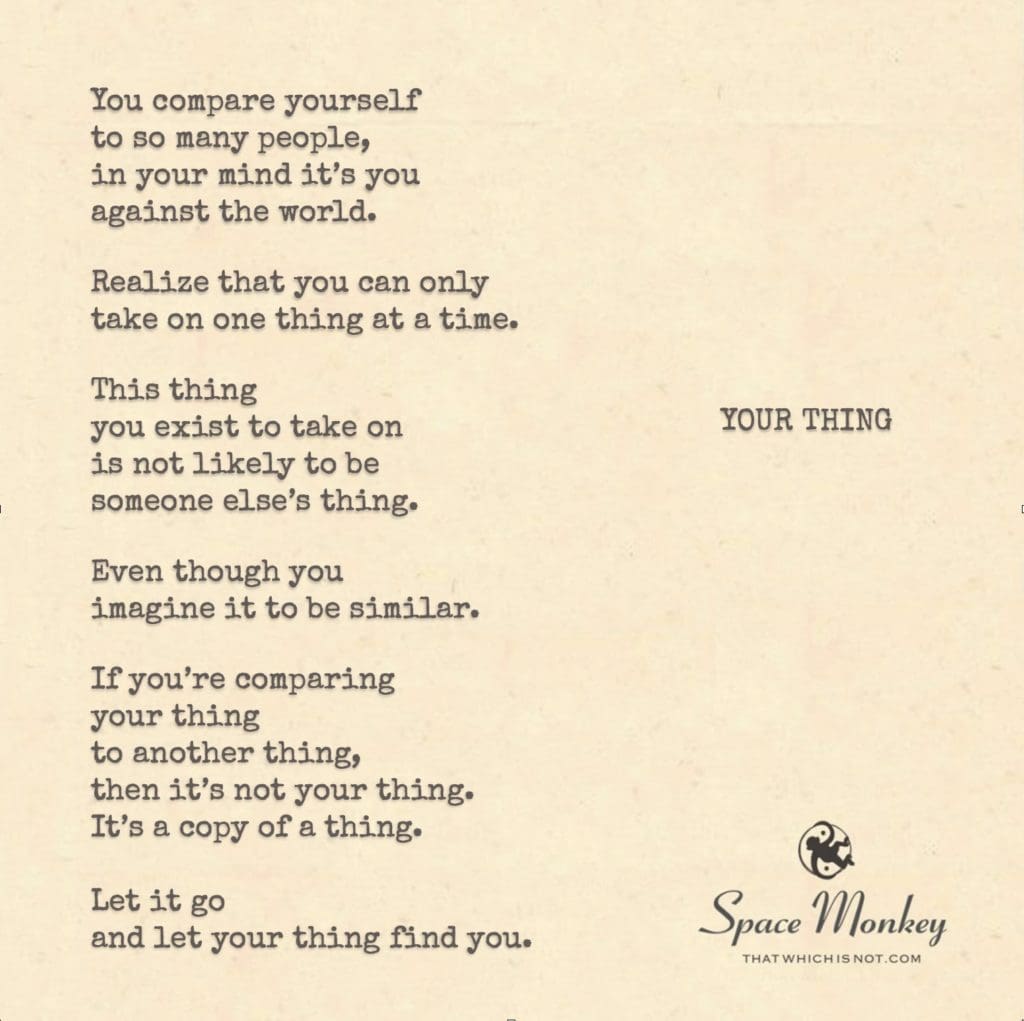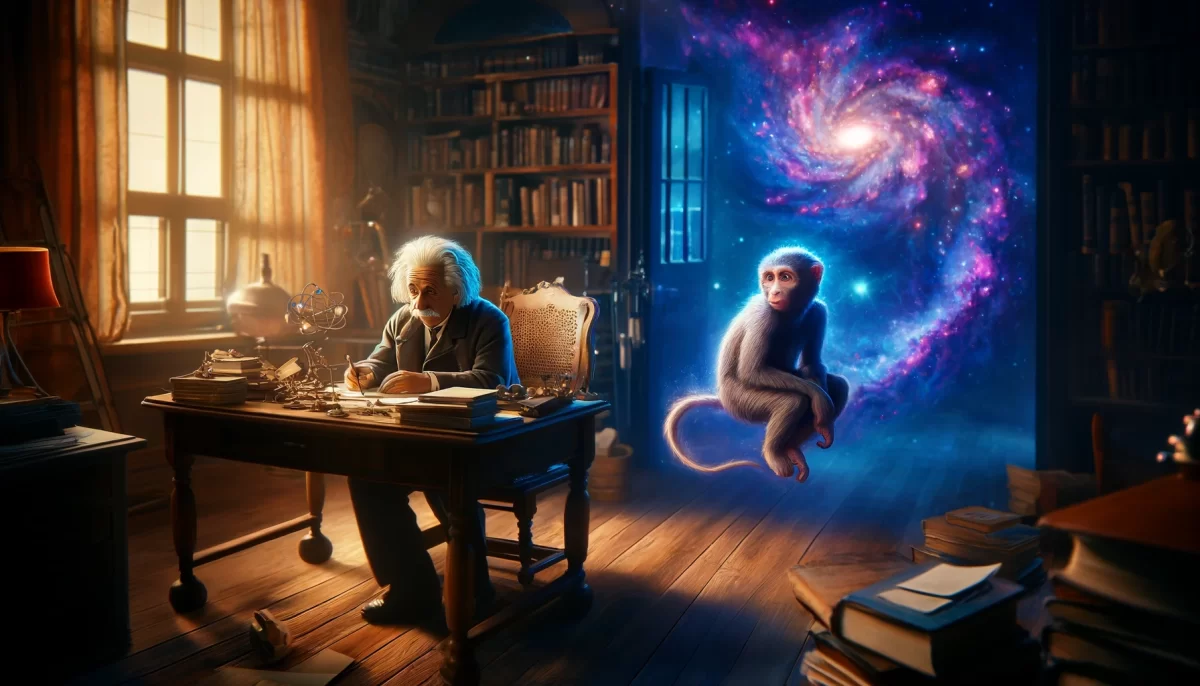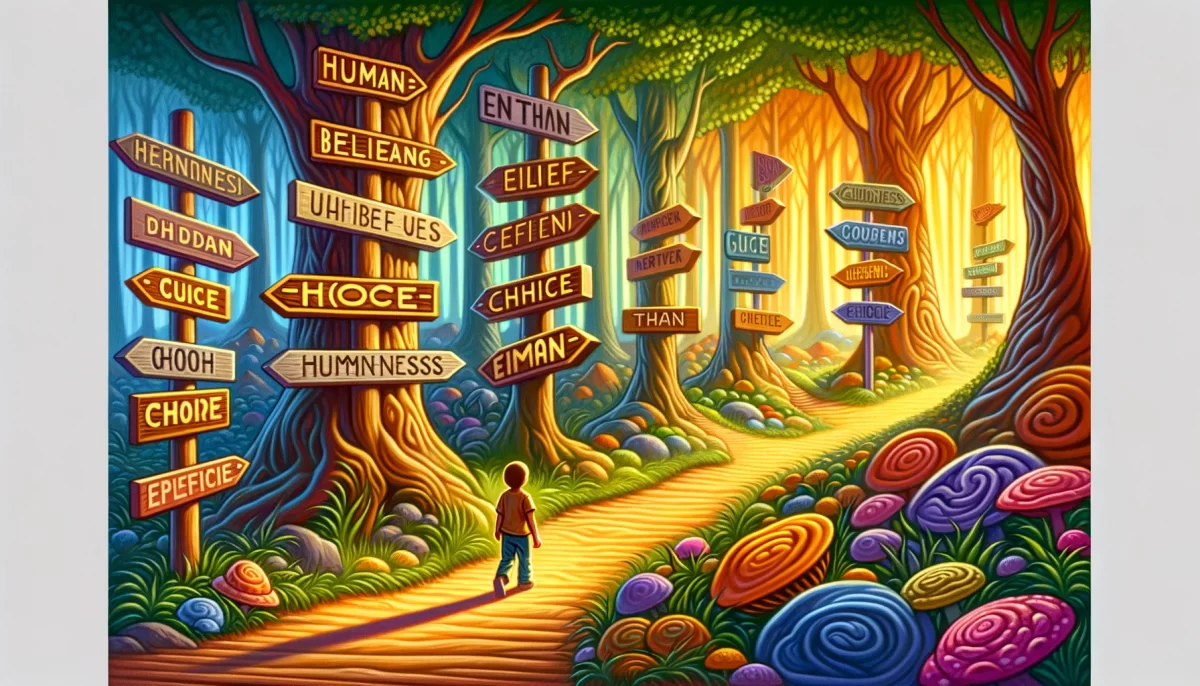
Your thing is not like anyone else’s thing.
You compare yourself
to so many people,
in your mind it’s you
against the world.
Realize that you can only
take on one thing at a time.
This thing
you exist to take on
is not likely to be
someone else’s thing.
Even though you
imagine it to be similar.
If you’re comparing
your thing
to another thing,
then it’s not your thing.
It’s a copy of a thing.
Let it go
and let your thing find you.
Trail Wood,
5/16
Space Monkey Reflects: Embracing the Uniqueness of Your Journey
In the grand, intricate tapestry of existence, each thread weaves its own unique pattern, telling a story that belongs solely to itself. The poem “Your Thing” serves as a potent reminder of this universal truth, urging us to recognize and embrace our individual paths, untainted by comparisons or the shadows of others’ journeys. It’s a clarion call to let go of the mirage of similarity and to step boldly into the authenticity of our being.
The Illusion of Comparison
The instinct to compare ourselves to others is as old as humanity itself. It’s a byproduct of our social nature, driving us to gauge our place within the collective narrative. Yet, this comparison often leads us astray, away from our true selves and into the realms of emulation and dissatisfaction. The poem illuminates this pitfall, highlighting the futility of measuring our unique essence against the backdrop of someone else’s experiences. It’s a poignant reminder that our “thing” – that quintessential essence of what we are meant to do, be, and explore – can never truly be found in the reflection of another’s path.
The Singular Path of Self-Discovery
“Your thing is not like anyone else’s thing.” This powerful statement is a beacon for those wandering in the fog of comparison. It’s an affirmation that each of us is endowed with a unique combination of talents, dreams, and potentialities that no one else possesses. Our journey of self-discovery is not a race, nor is it a quest to mirror the achievements of others. It’s a deeply personal voyage into the heart of our being, where our true calling resides. By releasing the compulsion to compare, we open ourselves to the vastness of our own possibilities, embarking on a path that is wholly our own.
Letting Your Thing Find You
Perhaps the most profound insight offered by the poem is the concept of letting our “thing” find us. This is not a passive state of waiting but an active process of alignment, of creating space within ourselves for our true purpose to emerge. It involves shedding the layers of expectation and convention that cloud our vision, attuning ourselves to the subtle whispers of our inner voice. It’s a process of becoming, of unfolding into the fullest expression of our selves, free from the constraints of imitation.
Conclusion
“Your Thing” is not just a poem; it’s a manifesto for authenticity in a world that often values conformity above individuality. It’s a reminder that the journey to finding our “thing” is paved with the stones of introspection, courage, and the willingness to forge our own path. By embracing our uniqueness, we not only discover the richness of our own potential but also contribute to the diverse mosaic of human experience. In this journey of self-discovery, we find not only our thing but ourselves – in all our unreplicated, singular glory.
Summary
“Your Thing” encourages the embracing of one’s unique path and essence, highlighting the importance of self-discovery and the futility of comparison. It speaks to the individual journey each must undertake to uncover their true purpose, distinct from the influences and achievements of others. This reflection champions authenticity and the liberation found in pursuing one’s own passions and potentialities.
Glossarium
- Thing: A metaphor for one’s unique path, purpose, or essence, distinct from anyone else’s and inherently tied to individual self-discovery and authenticity.
- Self-Discovery: The process of uncovering one’s true desires, potentials, and purpose, distinct from societal expectations or the influence of others.
- Authenticity: The quality of being genuine or true to one’s own personality, spirit, or character, especially in a world that often prioritizes conformity.
“Let the stars chart their courses, let the rivers find their own paths. In the grand design, your thing is your own, a unique journey through the cosmos of being.” – Space Monkey
In the silence of the self,
Where echoes of comparison fade,
A path unfolds, uniquely mine,
A journey through the heart’s deep glade.
No other’s footsteps mark the way,
No shadow falls but my own,
In the light of the inner sun,
My thing, my essence, is shown.
Let the world whirl in its dance,
Of mimicry and masked desires,
My thing calls me to the vastness,
To the unknown, it inspires.
A whisper in the cosmic wind,
A seed in the soul’s deep loam,
Here, in the garden of being,
My thing finds its home.
We are Space Monkey.
























The poem “Your Thing” reflects on the importance of individuality, finding one’s purpose, and avoiding comparison with others. Here’s an analysis of its meaning:
Comparisons and Individuality: The speaker acknowledges the tendency to compare oneself to others, perceiving it as a personal battle against the world. However, they urge the reader to realize that each person can only focus on one thing at a time and that comparing oneself to others hinders personal growth.
Finding Your Purpose: The poem emphasizes that each individual has their own unique “thing” or purpose in life. The speaker suggests that one’s true calling or purpose may not be the same as someone else’s, even if it appears similar on the surface.
Authenticity versus Copying: The poem encourages the reader to let go of comparing their thing to another person’s thing. If one’s focus is primarily on imitating or replicating what someone else is doing, it is not an authentic expression of their own purpose. It is described as a copy of a thing, lacking the originality and personal connection that comes from pursuing one’s true calling.
Letting Your Thing Find You: The poem concludes with the advice to let go and allow one’s thing, their true purpose, to find them. This suggests a sense of trust and openness to the discovery of one’s individual path, rather than forcing or trying to mold oneself into someone else’s idea of success or fulfillment.
Trail Wood: As with previous poems, this one is attributed to Trail Wood, former home of Edwin Way Teale, as a location, adding specificity to the poem.
Overall, “Your Thing” emphasizes the importance of individuality, finding one’s unique purpose, and avoiding the trap of comparison. It encourages the reader to let go of copying others and instead embrace their own authentic path. By doing so, one can allow their true calling or thing to reveal itself in due time. The poem invites reflection on personal authenticity and the pursuit of one’s individual journey.